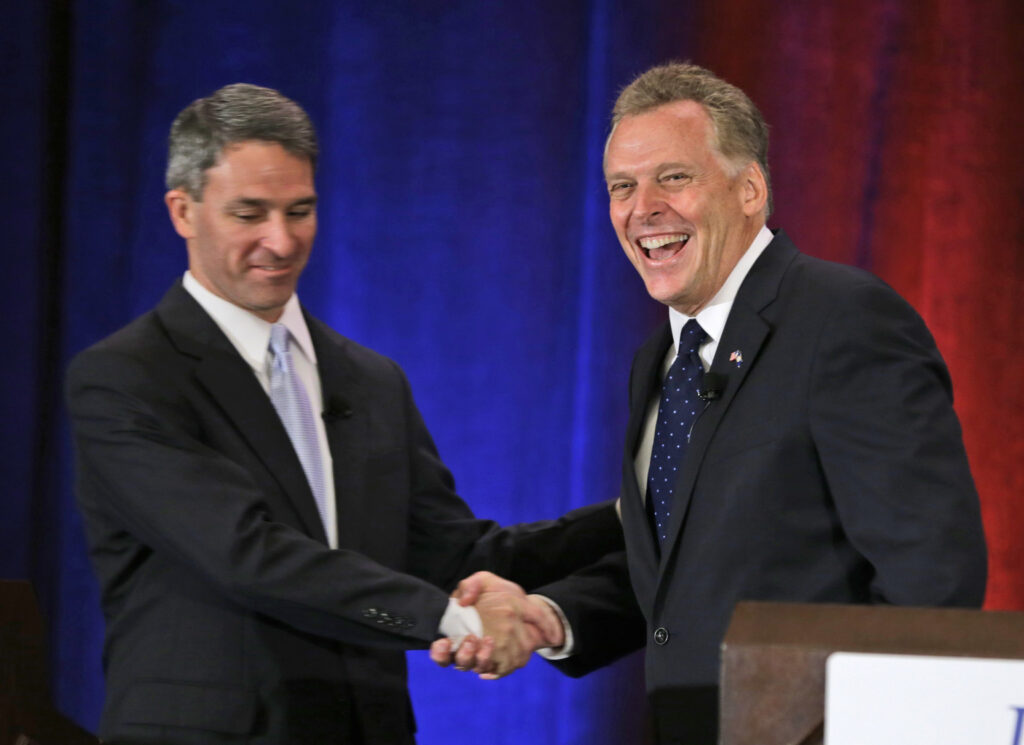The question of whether Virginia will accept the Medicaid expansion under President Obama’s health care law may be answered in the voting booth when residents pick their next governor.
Ever since the U.S. Supreme Court ruled that states could choose whether or not to accept billions in federal funding to expand their Medicaid rolls, the question has dogged Virginia on whether it would join the 26 states currently participating in the expansion. The gubernatorial candidates—Republican Ken Cuccinelli and Democrat Terry McAuliffe—are diametrically opposed on the subject.
Cuccinelli, as Virginia’s attorney general, was among the first to file suit against Obama’s law, testing its constitutionality before the Supreme Court, and is firmly against the expansion. Implementation of Obama’s law is the cornerstone of McAuliffe’s health care platform. His campaign claims the Medicaid expansion “can create jobs, reduce costs, and provide lifesaving coverage to hundreds of thousands.”
Current Republican Gov. Bob McDonnell, who has so far opposed expansion, helped form the Medicaid Innovation and Reform Commission to study the issue. But whoever is elected will likely decide the matter.
Major Decision for Next Governor
Expanding the rolls would pour billions of dollars of federal funds into the state’s coffers until at least 2019, but it will also increase the cost Virginia has to kick into the system as more residents become eligible for Medicaid, potentially ballooning the state budget to cover the added expense.
With a multibillion-dollar decision on the line, it’s an issue that should hold great interest with voters. But thus far, according to Geoff Skelley of the University of Virginia’s Center for Politics, voters haven’t engaged much on the issue.
“Part of me says it’s probably not going to be a top-tier issue,” said Skelley. “I think it probably should be a top-tier issue, but I think some of the personal stuff going on with these candidates is probably going to take top billing. I don’t think that Medicaid will be ignored, but I am not sure it will be a chief issue in this election.”
Poll Shows Virginians Divided
A new survey by the Thomas Jefferson Institute for Public Policy sheds light on the ambiguity Virginians feel when it comes to Medicaid expansion. They like the idea, but only if the federal government bears 90 percent of the tab. They think Medicaid is a worthwhile program, but it shouldn’t be expanded without cost-effective reforms first.
The survey, conducted by Magellan Strategies, surveyed 1,463 likely voters in six Virginia counties — Augusta, Fairfax, Frederick, Henrico, Portsmouth, and Powhatan — and asked a series questions regarding the potential expansion.
With a 2.56 percent margin of error, the survey showed Virginians are certainly in favor of Medicaid, and likely in favor of the expansion, but only if the state doesn’t have to foot the bulk of the bill. Among other results, the survey found:
- Forty-eight percent were in favor of Virginia expanding Medicaid as long as the federal government covered 90 percent of the cost; 41 percent were opposed, 8 percent were unsure and 3 percent had no opinion.
- But, 45 percent opposed expansion if Virginia had to return to the current 50-50 cost split with the federal government; 43 percent favored expansion, 10 percent were unsure and 2 percent had no opinion.
- Fifty-one percent thought, “Medicaid is a good program that provides essential health-care benefits to the deserving poor.” Forty percent felt Medicaid was “a flawed program that wastes a lot of money, has problems of fraud and is in severe need of reform.” Nine percent were undecided.
- But, 50 percent thought the argument that Medicaid should not be expanded until waste, fraud and abuse in the program is cleaned up was convincing; 28 percent did not find the argument convincing, 19 percent were somewhat convinced, and 3 percent were unsure.
“I think that survey shows that people are cautious about expansion,” said Michael Thompson, president of the Thomas Jefferson Institute. “They’re willing to do it, but only when some serious questions are resolved.”
The Medicaid Innovation and Reform Commission, a 12-member body composed of members of the state House and Senate, is researching the feasibility of the expansion and what reforms should be in place to streamline Medicaid’s operation.
“It’s a simple (issue) in understanding that people want reform before you expand. The complex issue is how to you reform Medicaid and make sure the reforms are effective,” Thompson said. “If the commission votes no, then I guess it’s a 52-card pick-up in January, depending on the make-up of the House, the Senate and who the governor is.”
Voters Divided on Expansion
In a remarkably close race, the expansion question remains equally divisive. A Quinnipiac University poll in March found 45 percent of registered voters supported expanding Medicaid while 43 percent were opposed, but that was within a 3 percent margin of error.
That, Skelley said, leaves the door open for independent groups such as political action committees to use attack ads focused on the issue to squeeze votes from either candidate.
“I think probably the best way to look at it is that this could get wrapped into the larger discussion of health care,” he said.
Carten Cordell ([email protected]) writes for Virginia Watchdog.




